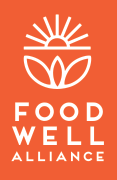Food Well Alliance's Working Tables are collaborations among organizational leaders to build a common language and prioritize strategic steps of implementation around a challenge or problem within Atlanta’s local food system. The outcome of this facilitation is a set of shared goals to achieve targeted results.
Community-Based Composting Working Table
Food Well Alliance is devoted to fostering collaborative experiences that help the local food movement build a healthy food system together.
These collaborative experiences in turn encourage problem-solving and ongoing learning, which increases the effectiveness of local food movement leaders and stakeholders.
After hearing from compost experts, entrepreneurs, educators, and advocates about their need for access to high-quality compost, Food Well Alliance brought community leaders together in January 2017 to team up on how to systematically advance community-based composting for Atlanta’s community gardeners and farmers.
The Community-Based Composting Working Table held 4 in-person sessions, spanning 3 months with 15 private, public, and nonprofit stakeholders with more than 150 years of combined composting experience. The sessions comprised more than 13 hours of convening time, and 8 separate operator interviews which resulted in reaching a consensus on 9 strategic recommendations to increase community-based composting in Metro Atlanta.
The Community-Based Composting Working Table collaborated on a shared vision, identified community-based composting opportunities and challenges, and formulated strategic recommendations to increase community-based composting capacity in Metro Atlanta urban farms and community gardens. These findings have been published in a white paper, which highlights an overview of the community-based composting opportunities and challenges, and nine strategic recommendations to increase community-based composting in Metro Atlanta.
Strategic Recommendations
1. Convene an Atlanta Community-based Composting Council. Learn More about the Composting Council. Learn more.
2. Increase awareness among millennials on the importance of healthy soil.
3. Establish a “hub and spoke” system to increase compost production.
4. Encourage community agriculture stakeholders to collaborate on identifying funding sources.
5. Encourage stakeholders to collaborate and create baseline measures to increase community-based composting in Metro Atlanta.
6. Encourage the Atlanta Community-based Composting Council and Georgia Restaurant Association to leverage technology and implement training to reduce feedstock contamination.
7. Provide annual community-based compost operator training.
8. Metro Atlanta local governments should work closely with state and federal agencies to coordinate compost production efforts.
9. Develop a statewide soil strategy.
Members of the Working Table
Food Well Alliance thanks the Community-based Composting Working Table members who shared their expertise to advance composting in Metro Atlanta. These stakeholders represented many views, perspectives, and organizations who are involved in composting within Metro Atlanta.
Atlanta Community Food Bank
City of Atlanta Mayor’s Office of Sustainability
ChooseGoodness
Compostwheels
Georgia Recycling Coalition
Georgia Restaurant Association
Mercedes Benz Stadium
Natureworks
Republic Services
Southern Green
Terra Nova Compost
Truly Living Well
U.S. Environmental Protection Agency



